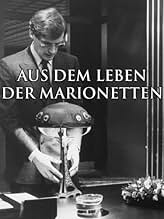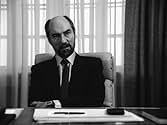CALIFICACIÓN DE IMDb
7.2/10
5 k
TU CALIFICACIÓN
Un recuento de eventos antes y después de un homicidio cometido por un hombre de negocios perturbado en un tenso matrimonio, y qué lo motivó a cometer ese acto atroz.Un recuento de eventos antes y después de un homicidio cometido por un hombre de negocios perturbado en un tenso matrimonio, y qué lo motivó a cometer ese acto atroz.Un recuento de eventos antes y después de un homicidio cometido por un hombre de negocios perturbado en un tenso matrimonio, y qué lo motivó a cometer ese acto atroz.
- Premios
- 1 premio ganado en total
Paul Bürks
- The Assistant in the fashion show
- (sin créditos)
- Dirección
- Guionista
- Todo el elenco y el equipo
- Producción, taquilla y más en IMDbPro
Opiniones destacadas
Bergman made this film in Germany, while in exile from Sweden for tax-related reasons. It's a dark and disturbing psychological portrait of a man, Peter, who murders a prostitute in the opening scene. The film moves back and forth in time, using title cards to establish the setting in time, trying to explain Peter's troubles. It's reminiscent of Scenes from a Marriage, as Peter has problems relating to his wife, Katarina. A few weeks before the murder, he started having fantasies and dreams about murdering her. The prologue, depicting the murder (or, more precisely, the moments before the murder) and the epilogue (Peter in prison) are filmed in color, but everything else is in black and white. The composition is generally not showy, but there is an amazingly filmed dream sequence, the film's centerpiece. The script is generally brilliant, very observant. The only thing I felt was a little underdeveloped was the homosexual character, Tim, and Peter's supposed latent homosexuality, which the psychoanalyst character describes near the end. I wasn't quite sure what to make of that material. 9/10.
Pros:
1. The movie begins with an eye-catching opening which is simultaneously tense, suspenseful, and unflinchingly brutal. It also serves as an intriguing view into the main character.
2. The flashbacks are presented with a black-and-white colour palette, which is just a nice and simple way of delineating them from the present.
3. Both Robert Atzorn (Peter Egermann) and Christine Buchegger (Katarina Egermann) deliver fantastic performances.
4. The film serves as a fascinating insight into the mind of a psychopath who also happens to be suffering from marriage and sex issues.
5. The cinematography, especially in regards to the framing of the shots, is sharp and concise.
Cons: 1. The sound design is a little off at times. 2. The continuous sex, and sex-related content, starts to get a little repetitive. 3. The movie, at times, feels too pretentious which pulls the viewer out of the immersion.
Cons: 1. The sound design is a little off at times. 2. The continuous sex, and sex-related content, starts to get a little repetitive. 3. The movie, at times, feels too pretentious which pulls the viewer out of the immersion.
A complex dissection of a murder and a murderer, told by jumping back and forth in time, before and after the event, A deeply disturbing portrait of a man and a society so cut off from feeling that violence seems almost inevitable.
While more divided in public reaction then some of Bergman's most beloved works, I think this edgy, bold, uncomfortable film ranks close to some of his best work. While there are moments of pretension, there's also a lot of human and psychological complexity (and wonderful acting) in this bleak exploration of how near murder and madness lie to any of us.
While more divided in public reaction then some of Bergman's most beloved works, I think this edgy, bold, uncomfortable film ranks close to some of his best work. While there are moments of pretension, there's also a lot of human and psychological complexity (and wonderful acting) in this bleak exploration of how near murder and madness lie to any of us.
This is totally engaging but its almost just theater: the long scenes, still camera, monologues, exposition of internal psycho-drama and chapters that structure the entire film.
But most of all its the interest and compassion contained in the human face and voice that Bergman makes central. That had been part of Bergman's work for a long time, just look at "Through a Glass Darkly". The characters are moving through space but not able to connect with each other at all, they simulate free will but they are not able to live it.
Having said all of the above the photography and set ups are occasionally sublime, the sort of thing that was the essence of cinema, but not so any more.
But most of all its the interest and compassion contained in the human face and voice that Bergman makes central. That had been part of Bergman's work for a long time, just look at "Through a Glass Darkly". The characters are moving through space but not able to connect with each other at all, they simulate free will but they are not able to live it.
Having said all of the above the photography and set ups are occasionally sublime, the sort of thing that was the essence of cinema, but not so any more.
Bergman's working with a very restricted palette here, as he did with The Rite or Winter Light. The romantic, funny touches you expect from him are missing. Peter's mind is crumbling; he's a modern Othello obsessed with his wife's fidelity amid the tasteful furniture of their elegant home. All the action is seen through the distorting lens of Peter's madness. Why would his wife say, in front of strangers, that she has to get drunk to steady her nerves at her mother-in-law's place? This is the disturbed mind at work.
The acting is fine. Robert Atzorn and Walter Schmidinger do very well as, essentially, two sides of the same coin (the stodgy businessman and the gay fashion designer). Christina Buchegger is wonderful as Katharina, the wife; her attempts to win out over Peter's psychosis give the film what drama it has.
The acting is fine. Robert Atzorn and Walter Schmidinger do very well as, essentially, two sides of the same coin (the stodgy businessman and the gay fashion designer). Christina Buchegger is wonderful as Katharina, the wife; her attempts to win out over Peter's psychosis give the film what drama it has.
¿Sabías que…?
- TriviaDe la vida de las marionetas (1980) is Director Ingmar Bergman's only movie shot in the German language. El huevo de la serpiente (1977) was shot in Germany, too, but mostly in English.
- ConexionesFeatured in Drugoe Kino: From the Life of the Marionettes (2006)
- Bandas sonorasTouch Me, Take Me
Performed by Rita Wright
Selecciones populares
Inicia sesión para calificar y agrega a la lista de videos para obtener recomendaciones personalizadas
Detalles
- Fecha de lanzamiento
- Países de origen
- Idioma
- También se conoce como
- From the Life of the Marionettes
- Locaciones de filmación
- Productoras
- Ver más créditos de la compañía en IMDbPro
Taquilla
- Total a nivel mundial
- USD 4,293
- Tiempo de ejecución
- 1h 44min(104 min)
- Color
- Mezcla de sonido
Contribuir a esta página
Sugiere una edición o agrega el contenido que falta





























